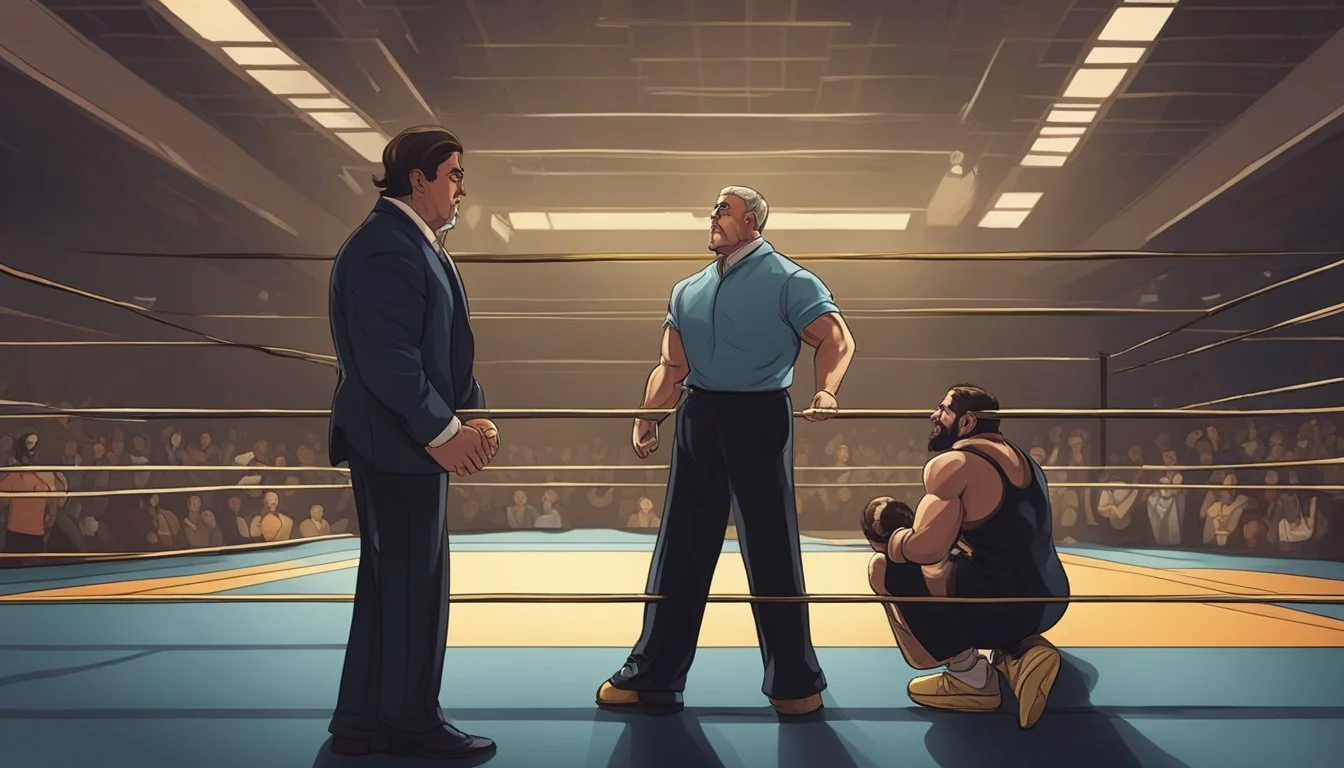The True Foxcatcher: The Tragic Story of John du Pont and Dave Schultz
Olympic Wrestling's Darkest Chapter
The story of Foxcatcher Farm intertwines the lives of two remarkable men: John du Pont, heir to one of America's wealthiest families, and Dave Schultz, an Olympic gold medalist in wrestling. Their paths crossed in the mid-1990s, leading to a tragic outcome that shocked the sports world and beyond.
On January 26, 1996, John du Pont shot and killed Dave Schultz on the grounds of Foxcatcher Farm in Pennsylvania. This act of violence marked the culmination of a complex relationship between the eccentric millionaire and the accomplished athlete. Du Pont had established Foxcatcher as a training center for wrestlers, providing financial support and facilities for top competitors like Schultz and his brother Mark.
The events that unfolded at Foxcatcher have since been the subject of books, documentaries, and a Hollywood film. The story raises questions about wealth, ambition, mental health, and the pursuit of athletic excellence. It serves as a cautionary tale about the potential dangers of unchecked power and the devastating consequences that can arise when dreams and reality collide.
The Legacy of Dave Schultz
Dave Schultz left an indelible mark on the world of wrestling. His Olympic gold medal in freestyle wrestling at the 1984 Los Angeles Games cemented his status as one of America's greatest wrestlers.
Schultz's impact extended far beyond his personal achievements. He was renowned for his coaching abilities and willingness to mentor other athletes. Many wrestlers benefited from his guidance and expertise.
The Dave Schultz Wrestling Club was established in his honor, continuing his legacy of nurturing talent. This organization provides support and training opportunities for aspiring wrestlers across the United States.
An annual wrestling tournament, the Dave Schultz Memorial International, attracts top competitors from around the world. It serves as a testament to his enduring influence on the sport.
Schultz's tragic death at the hands of John du Pont shocked the wrestling community. It brought attention to the need for better mental health awareness and support systems in sports.
His story inspired the critically acclaimed film "Foxcatcher," introducing a new generation to his life and accomplishments. The movie helped preserve his memory and shed light on the events surrounding his untimely death.
Dave Schultz's legacy lives on through the countless lives he touched as a competitor, coach, and mentor. His passion for wrestling and dedication to helping others continue to inspire athletes and fans alike.
John du Pont: The Heir to an Empire
John Eleuthère du Pont was born into immense wealth and privilege on November 22, 1938. As an heir to the Du Pont family fortune, he had access to vast resources from a young age.
The Du Pont dynasty built its empire on chemical manufacturing, becoming one of America's wealthiest and most influential families. John's great-great-grandfather, Éleuthère Irénée du Pont, founded the company in 1802.
Despite his family's business legacy, John pursued diverse interests:
Ornithology
Philately
Conchology
Sports
He used his wealth to fund these passions, establishing the Delaware Museum of Natural History in 1972. The museum housed his extensive collections of birds and shells.
Du Pont's involvement in wrestling began in the 1980s. He built a state-of-the-art training facility called Foxcatcher Farm on his family's estate in Newtown Square, Pennsylvania.
The facility attracted top athletes, including Olympic champions Mark and Dave Schultz. Du Pont saw himself as a patron of American wrestling, using his fortune to support the sport and its athletes.
His erratic behavior and mental health issues became increasingly apparent over time. This culminated in the tragic murder of Dave Schultz on January 26, 1996, an event that shocked the sports world and ended Du Pont's reign as a wrestling benefactor.
Building the Team Foxcatcher
John du Pont's ambitious vision for Team Foxcatcher began to take shape in the late 1980s. He aimed to create an elite wrestling program that would dominate the sport and produce Olympic champions.
The Vision of an Elite Training Facility
Du Pont transformed his Foxcatcher Farm estate into a state-of-the-art training center. He built a 14,000-square-foot wrestling facility equipped with top-of-the-line equipment and amenities. The complex included multiple wrestling mats, weight rooms, and living quarters for athletes.
Du Pont spared no expense, investing millions into the facility. He added an Olympic-sized swimming pool and other athletic facilities to support comprehensive training regimens. The estate's grounds provided ample space for outdoor conditioning and team-building activities.
Recruiting Wrestlers and Coaches
Du Pont actively sought out the best wrestling talent in the country. He offered generous stipends, housing, and world-class training opportunities to attract top athletes. Dave Schultz was one of the first prominent wrestlers to join Team Foxcatcher in 1989.
The team grew to include other Olympic medalists and world-class competitors. Du Pont hired experienced coaches to oversee the program and develop training strategies. He leveraged his connections and wealth to bring in guest instructors and international training partners.
Du Pont's recruitment efforts extended beyond athletes. He brought in sports psychologists, nutritionists, and medical staff to support the wrestlers' physical and mental well-being.
The Path to Tragedy
John du Pont's erratic behavior and Dave Schultz's influential presence at Foxcatcher Farms set the stage for a volatile situation. Tensions escalated as du Pont's mental state deteriorated, leading to a tragic culmination of events.
John du Pont's Eccentric Behavior
John du Pont, heir to the du Pont family fortune, displayed increasingly bizarre conduct at Foxcatcher Farms. He developed a fascination with wrestling and established a training facility on his estate.
Du Pont's behavior grew more unpredictable over time. He installed security cameras across the property and began carrying firearms regularly. His paranoia intensified, and he made wild accusations against staff and wrestlers.
Some reported du Pont using cocaine and drinking heavily. He often rambled incoherently and claimed to be various personas, including the Dalai Lama and a Russian spy. These actions raised concerns among those at Foxcatcher Farms.
Dave Schultz's Impact and Influence
Dave Schultz, an Olympic gold medalist, became a central figure at Foxcatcher Farms. His skill and charisma attracted top wrestlers to the training center. Schultz's presence lent credibility to du Pont's wrestling program.
Many wrestlers looked up to Schultz as a mentor and role model. He fostered a sense of community among the athletes at Foxcatcher. Schultz's leadership and coaching abilities were highly valued by both du Pont and the wrestlers.
Despite du Pont's erratic behavior, Schultz remained at Foxcatcher. He attempted to mediate conflicts between du Pont and other team members. Schultz's loyalty and diplomatic nature made him indispensable to the program.
Strained Relations and Increasing Tension
As du Pont's mental state deteriorated, his relationship with Dave Schultz became strained. Du Pont grew jealous of Schultz's popularity and influence among the wrestlers.
Schultz's wife reported feeling uncomfortable with du Pont's behavior. The Schultz family considered leaving Foxcatcher, but Dave felt obligated to stay and support the other athletes.
Du Pont's paranoia intensified, and he began to view Schultz as a threat. He made irrational demands and accused Schultz of conspiring against him. The atmosphere at Foxcatcher grew increasingly tense and unpredictable.
In the weeks leading up to the tragedy, du Pont's behavior became more erratic. He fired several staff members and made threatening statements. Despite growing concerns, few anticipated the violent turn events would take.
The Fatal Encounter: January 26, 1996
On a cold winter day in Pennsylvania, tragedy struck at the Foxcatcher Farm estate. Olympic gold medalist Dave Schultz was shot three times by John E. du Pont, heir to the du Pont family fortune.
The incident occurred without warning. Schultz, a beloved figure in the wrestling community, was training for the upcoming 1996 Atlanta Olympics at du Pont's facility.
Du Pont's motives for the murder remain unclear. Known for his eccentric behavior, he had previously made strange claims about ghosts and spies in his mansion.
After the shooting, du Pont barricaded himself inside his home. A tense standoff with law enforcement ensued, lasting two days before authorities finally apprehended him.
The wrestling world was left in shock. Schultz, at 36 years old, was at the peak of his career when his life was cut short. His brother Mark, also an Olympic gold medalist, was devastated by the loss.
This tragic event marked the end of Foxcatcher Farm as a premier wrestling training facility. It also exposed the dark underbelly of a seemingly idyllic partnership between a wealthy patron and elite athletes.
Aftermath and Legal Proceedings
Following Dave Schultz's murder on January 26, 1996, John du Pont barricaded himself inside his mansion on Foxcatcher Farm. A two-day standoff with police ensued before du Pont was finally apprehended.
Du Pont's trial began in January 1997. His defense team argued that he was mentally ill and not criminally responsible for his actions. They claimed he suffered from paranoid schizophrenia.
Despite these efforts, the jury found du Pont guilty but mentally ill of third-degree murder on February 25, 1997. He was sentenced to 13 to 30 years in prison.
Du Pont appealed his conviction multiple times but was unsuccessful. He remained incarcerated at State Correctional Institution - Laurel Highlands in Somerset County, Pennsylvania.
On December 9, 2010, John du Pont died in prison at the age of 72. His death was attributed to chronic obstructive pulmonary disease and other natural causes.
The Schultz family filed a wrongful death lawsuit against du Pont's estate. In 2000, they reached a confidential settlement agreement.
Dave Schultz's tragic death sent shockwaves through the wrestling community. His legacy lives on through various memorials and wrestling tournaments held in his honor.
The Foxcatcher Legacy
The Foxcatcher tragedy left an indelible mark on the world of wrestling and American sports culture. It sparked discussions about mental health, wealth, and the pursuit of athletic excellence.
Cultural and Sporting Impact
The Foxcatcher incident shook the wrestling community to its core. Dave Schultz's death highlighted the vulnerability of athletes, even at the highest levels of competition. The tragedy led to increased scrutiny of private sports sponsorships and training facilities.
Wrestling programs across the U.S. implemented stricter safety protocols. Many athletes became more cautious about their relationships with sponsors and benefactors. The incident also brought attention to the mental health challenges faced by both athletes and wealthy individuals.
The Foxcatcher Farm, once a symbol of athletic ambition, became associated with tragedy. Its closure marked the end of a unique experiment in sports patronage.
Media Portrayals and The True Foxcatcher
The Foxcatcher story captivated public imagination, leading to various media adaptations. The 2014 film "Foxcatcher," directed by Bennett Miller, brought the story to mainstream audiences. Steve Carell's portrayal of John du Pont earned critical acclaim and an Oscar nomination.
Several books, including Mark Schultz's memoir, offered first-hand accounts of the events. These works provided deeper insights into the complex relationships between du Pont and the Schultz brothers.
Documentaries explored the case from different angles, examining du Pont's psychology and the wrestling community's response. These portrayals often sparked debates about the balance between artistic interpretation and historical accuracy.
Lessons from the Tragedy
The Foxcatcher incident prompted serious reflections on several fronts. It underscored the importance of mental health support in high-pressure environments like elite sports. Many organizations implemented more robust psychological screening and support systems.
The case also highlighted the potential dangers of unchecked wealth and influence in sports. It led to discussions about the ethics of private sponsorship and the power dynamics between benefactors and athletes.
Law enforcement agencies reassessed their approach to dealing with influential individuals in crisis situations. The incident served as a case study in crisis management and negotiation tactics.
In the wrestling world, Dave Schultz's legacy inspired mentorship programs and scholarships. His commitment to the sport continues to influence wrestlers and coaches today.






